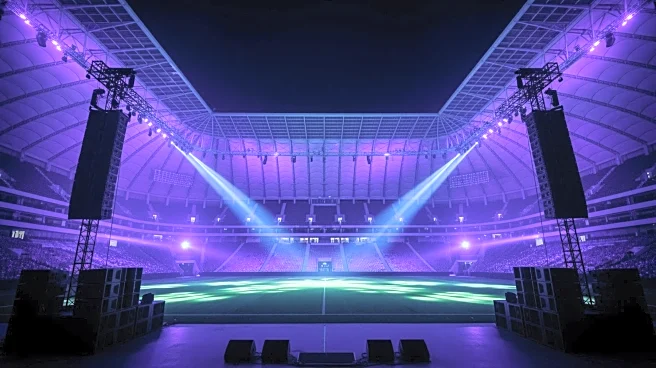What's Happening?
Ukraine remains in contention for a place in the 2026 World Cup as the UEFA qualifiers approach their final rounds. Under the management of Serhiy Rebrov, Ukraine has been playing its home matches in Poland due to the ongoing conflict with Russia. Currently,
Ukraine is second in Group D with seven points, trailing leaders France by three points. A crucial match against France in Paris on November 13 could determine Ukraine's direct qualification as group winners. However, a more likely scenario is finishing second, which would lead to a playoff spot. If Ukraine loses to France and Iceland defeats Azerbaijan, Ukraine will face Iceland in a decisive match at Warsaw's Polish Army Stadium, potentially securing a playoff position.
Why It's Important?
Ukraine's participation in the 2026 World Cup qualifiers is significant for several reasons. It highlights the resilience of Ukrainian sports amid geopolitical challenges, as the team continues to compete internationally despite not being able to host matches at home. Success in qualifying could boost national morale and provide a platform for showcasing Ukrainian talent on a global stage. Economically, participation in the World Cup could attract sponsorships and investments, benefiting Ukrainian football infrastructure. Additionally, it underscores the broader impact of political conflicts on sports, as Ukraine navigates logistical and strategic challenges in its quest for international recognition.
What's Next?
The upcoming matches will be crucial for Ukraine's World Cup aspirations. A victory against France could open the door for direct qualification, while a loss would necessitate a strong performance against Iceland to secure a playoff spot. The playoff system involves 12 runners-up from UEFA qualifying groups and four entrants based on Nations League performance, drawn into four paths with winners advancing to the World Cup. Stakeholders, including Ukrainian football authorities and fans, will closely monitor these developments, as the outcomes could influence future strategies and investments in Ukrainian football.
Beyond the Headlines
Ukraine's journey in the World Cup qualifiers also reflects broader themes of sports diplomacy and the role of athletics in fostering international solidarity. The team's ability to compete despite geopolitical tensions serves as a testament to the unifying power of sports. Moreover, it raises questions about the ethical responsibilities of international sports organizations in supporting nations affected by conflict, potentially influencing future policies on hosting and participation criteria.















